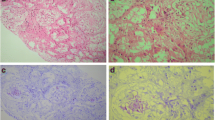Abstract
Colchicine is the standard treatment in familial Mediterranean fever (FMF) patients. New treatment strategies are needed in FMF patients who were unresponsive to colchicine therapy or who had developed amyloidosis. The aim of this study was to present clinical-laboratory features and treatment responses of pediatric FMF patients that were treated with anti-IL-1 therapies. Files of patients who had been followed in our department with diagnosis of FMF were retrospectively evaluated. Patients that have been receiving anti-IL-1 therapies (anakinra or canakinumab) were included to the study. All patients were interpreted with respect to the demographic data, clinical and laboratory features of the disease, genetic analysis of MEFV mutations and treatment responses. Among 330 currently registered FMF patients, 13 patients were included to the study. Seven of them received anti-IL-1 therapy due to colchicine resistance and 6 due to FMF-related amyloidosis (1 of them with nephrotic syndrome, 2 with chronic kidney disease, 3 with renal transplantation). In all treated patients, attacks completely disappeared or decreased in frequency; partial remission occured in nephrotic syndrome patient; and their life quality improved. Anti-IL-1 therapies can be successfully used in colchicine-resistant FMF patients and patients with amyloidosis during childhood and adolescent period without major side effects.
Similar content being viewed by others
References
Lidar M, Livneh A (2007) Familial Mediterranean fever: clinical, molecular and management advancements. Neth J Med 65:318–324
Mamou H, Cattan R (1952) La maladie periodique (sur 14 cas personnels dont 8 compliques de nephropathies). Sem Hop Paris 28:1062–1070
Goldfinger SE (1972) Colchicine for familial Mediterranean fever. N Engl J Med 287:1302
Özkan E, Okur Ö, Ekmekçi A, Özcan R, Tağ T (1972) A new approach to the treatment of periodic fever. Med Bull İstanbul 5:44–49
Touitou I, Sarkisian T, Medlej-Hashim M et al (2007) Country as the primary risk factor for renal amyloidosis in familial Mediterranean fever. Arthritis Rheum 56:1706–1712
Meinzer U, Quartier P, Alexandra JF, Hentgen V, Retornaz F, Kone-Paut I (2011) Interleukin-1 targeting drugs in familial Mediterranean fever: a case series and review of the literature. Semin Arthritis Rheum 41:265–271
Akgul S, Kılıç E, Kılıç G, Özgöçmen S (2013) Efficacy and safety of biological treatments in familial Mediterranean fever. Am J Med Sci 346:137–141
Ozçakar ZB, Yüksel S, Ekim M, Yalçınkaya F (2012) Infliximab therapy for familial mediterranean fever-related amyloidosis: case series with long term follow-up. Clin Rheumatol 31:1267–1271
Grattagliano I, Bonfrate L, Ruggiero V, Scaccianoce G, Palasciano G, Portincasa P (2014) Novel therapeutics for the treatment of familial Mediterranean fever: from colchicine to biologics. Clin Pharmacol Ther 95:89–97
Belkhir R, Moulonguet-Doleris L, Hachulla E, Prinseau J, Baglin A, Hanslik T (2007) Treatment of familial Mediterranean fever with anakinra. Ann Intern Med 146:825–826
Mitroulis I, Papadopoulos VP, Konstantinidis T, Ritis K (2008) Anakinra suppresses familial Mediterranean fever crises in a colchicine resistant patient. Neth J Med 66:489–491
Stojanovic KS, Delmas Y, Torres PU et al (2012) Dramatic beneficial effect of interleukin-1 inhibitor treatment in patients with familial Mediterranean fever complicated with amyloidosis and renal failure. Nephrol Dial Transplant 27:1898–1901
Moser C, Pohl G, Haslinger I et al (2009) Successful treatment of familial Mediterranean fever with anakinra and outcome after renal transplantation. Nephrol Dial Transplant 24:676–678
Alpay N, Şumnu A, Çalışkan Y, Yazıcı H, Türkmen A, Gül A (2012) Efficacy of anakinra treatment in a patient with colchicine resistant familial Mediterranean fever. Rheumatol Int 32:3277–3279
Yalçınkaya F, Özen S, Özçakar ZB et al (2009) A new set of criteria for the diagnosis of familial Mediterranean fever in childhood. Rheumatology (Oxford) 48:395–398
Aksentijevich I, Torosyan Y, Samuels J et al (1999) Mutation and haplotype studies of familial Mediterranean fever reveal new ancestral relationships and evidence for a high carrier frequency with reduced penetrance in the ashkenazi jewish population. Am J Hum Genet 64:949–962
Yilmaz E, Ozen S, Balci B et al (2001) Mutation frequency of familial Mediterranean fever and evidence for a high carrier rate in the turkish population. Eur J Hum Genet 9:553–555
The International FMF Consortium (1997) Ancient missense mutations in a new member of the roret gene family are likely to cause familial Mediterranean fever. Cell 90:797–807
The French FMF Consortium (1997) A candidate gene for familial Mediterranean fever. Nat Genet 17:25–31
Chae JJ, Aksentijevich I, Kastner DL (2009) Advances in the understanding of familial Mediterranean fever and possibilities for targeted therapy. Br J Haematol 146:467–478
Urieli-Shoval S, Linke RP, Matzner Y (2000) Expression and function of serum amyloid A, a major acute-phase protein, in normal and disease states. Curr Opin Hematol 7:64–69
Özdoğan H, Arısoy N, Kasapçopur Ö et al (1997) Vasculitis in familial Mediterranean fever. J Rheumatol 24:323–327
Tekin M, Yalçınkaya F, Tümer N et al (1999) Familial Mediterranean fever—renal involvement by diseases other than amyloid. Nephrol Dial Transplant 14:475–479
Livneh A, Langevitz P, Zemer D et al (1996) The changing face of familial Mediterranean fever. Semin Arthritis Rheum 26:612–627
Ben-Chetrit E, Levy M (1991) Colchicine prophylaxis in familial Mediterranean fever: reappraisal after 15 years. Semin Arthritis Rheum 20:241–246
Zemer D, Livneh A, Danon YL, Pras M, Sohar E (1991) Long term colchicine treatment in children with familial Mediterranean fever. Arthritis Rheum 34:973–977
Lidar M, Yonath H, Shechter N et al (2012) Incomplete response to colchicine in M694V homozygote FMF patients. Autoimmun Rev 12:72–76
Ozcakar ZB, Elhan AH, Yalcinkaya F (2014) Can colchicine response be predicted in familial Mediterranean fever patients. Rheumatology (Oxford). doi:10.1093/rheumatology/keu138
Yalcinkaya F, Ozcakar ZB, Tanyildiz M, Elhan AH (2011) Familial Mediterranean fever in small children in Turkey. Clin Exp Rheumatol 29:87–90
Dinarello CA, van der Meer JWM (2013) Treating inflammation by blocking interleukin-1 in humans. Semin Immunol 25:469–484
Conflict of interest
All authors declare that they have no conflict of interest.
Author information
Authors and Affiliations
Corresponding author
Rights and permissions
About this article
Cite this article
Özçakar, Z.B., Özdel, S., Yılmaz, S. et al. Anti-IL-1 treatment in familial Mediterranean fever and related amyloidosis. Clin Rheumatol 35, 441–446 (2016). https://doi.org/10.1007/s10067-014-2772-2
Received:
Revised:
Accepted:
Published:
Issue Date:
DOI: https://doi.org/10.1007/s10067-014-2772-2



